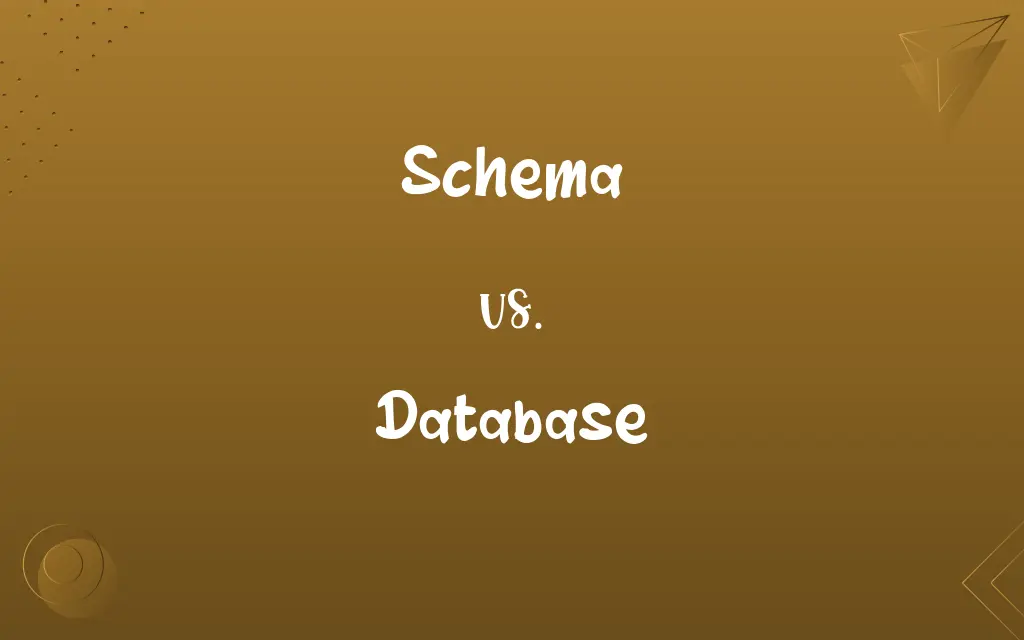Schema vs. Database: Know the Difference

By Shumaila Saeed || Published on February 10, 2024
A schema is a blueprint of the database structure, defining its tables, fields, and relationships, whereas a database is the actual collection of data organized according to that schema.

Key Differences
A schema, in the context of databases, is an abstract design that represents the structure of the database, including tables, columns, relationships, and constraints. On the other hand, a database is a collection of actual data that is organized and stored electronically, conforming to the structure defined by the schema. The schema acts as a template for organizing data, while the database is the implementation of this template with real data.
Shumaila Saeed
Feb 10, 2024
In a schema, the focus is on how the data is organized, such as the types of data stored in each column and the way tables are interrelated. Conversely, a database concerns itself with the storage, retrieval, and management of data. While the schema is more about design and structure, the database is about the content and operational aspects of data storage.
Shumaila Saeed
Feb 10, 2024
The schema of a database is generally static, meaning once defined, it doesn't change often. It lays out the blueprint for the database. The database itself, however, is dynamic, as it is constantly updated, queried, and manipulated. This highlights a fundamental difference in the nature of schemas (more static and structural) versus databases (more dynamic and content-oriented).
Shumaila Saeed
Feb 10, 2024
Altering a schema typically involves changes to the database structure, like adding or removing tables or fields, and can be complex. In contrast, changes to a database often involve adding, deleting, or updating the data within the existing structure. Thus, a schema change can be more significant and impactful than a change to the data within a database.
Shumaila Saeed
Feb 10, 2024
In summary, a schema is akin to an architectural blueprint for a database, outlining its structure without holding any actual data. A database, in contrast, is like a building constructed according to that blueprint, filled with actual data and in constant use.
Shumaila Saeed
Feb 10, 2024
ADVERTISEMENT
Comparison Chart
Focus
Data organization (tables, relationships)
Data storage, retrieval, and management
Shumaila Saeed
Feb 10, 2024
ADVERTISEMENT
Schema and Database Definitions
Schema
Schema refers to a diagrammatic representation of a system or theory.
The scientist drew a schema to explain the new theory of quantum mechanics.
Shumaila Saeed
Jan 24, 2024
Database
A database is an organized collection of data, typically stored and accessed electronically from a computer system.
The company's employee database contains personal and professional information about each staff member.
Shumaila Saeed
Jan 24, 2024
Schema
Schema can refer to an outline or model used to organize information or ideas.
He developed a schema to categorize the research findings systematically.
Shumaila Saeed
Jan 24, 2024
Database
In computing, a database is a structured set of data held in a computer, especially one that is accessible in various ways.
She queried the customer database to retrieve the latest sales figures.
Shumaila Saeed
Jan 24, 2024
Schema
In computer science, a schema is the structure behind data organization in a database.
The database schema outlines the relationships between the various tables.
Shumaila Saeed
Jan 24, 2024
ADVERTISEMENT
Database
A database is a systematic collection of data, often electronic, that is accessible in various ways.
The library's database contains a vast amount of information about published works.
Shumaila Saeed
Jan 24, 2024
Schema
In XML or other markup languages, a schema defines the legal elements and structure of the document.
The XML schema ensured that the document adhered to the correct format.
Shumaila Saeed
Jan 24, 2024
Database
A database is a collection of information organized for rapid search and retrieval.
The medical database provides quick access to patient histories.
Shumaila Saeed
Jan 24, 2024
Schema
A plan, outline, or model
A schema for prioritizing vaccinations.
A writer's schema for a novel.
Shumaila Saeed
Jan 22, 2024
Database
In the context of websites, a database stores information that can be retrieved and displayed dynamically.
The website's database dynamically loads user profiles based on login credentials.
Shumaila Saeed
Jan 24, 2024
Schema
(Psychology) A pattern imposed on complex reality or experience to assist in explaining it, mediate perception, or guide response.
Shumaila Saeed
Jan 22, 2024
Database
A collection of data arranged for ease and speed of search and retrieval. Also called data bank.
Shumaila Saeed
Jan 22, 2024
Schema
An outline or image universally applicable to a general conception, under which it is likely to be presented to the mind (for example, a body schema).
Shumaila Saeed
Jan 22, 2024
Schema
(databases) A formal description of the structure of a database: the names of the tables, the names of the columns of each table, and the data type and other attributes of each column.
Shumaila Saeed
Jan 22, 2024
Database
(general) A collection of (usually) organized information in a regular structure, usually but not necessarily in a machine-readable format accessible by a computer.
I have a database of all my contacts in my personal organizer.
Shumaila Saeed
Jan 22, 2024
Schema
(markup languages) A formal description of data, data types, and data file structures, such as XML schemas for XML files.
Shumaila Saeed
Jan 22, 2024
Database
(computing) A set of tables and other objects (queries, reports, forms) in the form of a structured data set.
The "books" database will have three tables, and the "customers" database will have two tables.
Shumaila Saeed
Jan 22, 2024
Schema
(logic) A formula in the metalanguage of an axiomatic system, in which one or more schematic variables appear, which stand for any term or subformula of the system, which may or may not be required to satisfy certain conditions.
Shumaila Saeed
Jan 22, 2024
Database
A software program (application) for storing, retrieving and manipulating such a structured data set.
Which database do you use: MySQL or Oracle?
Shumaila Saeed
Jan 22, 2024
Schema
An outline or image universally applicable to a general conception, under which it is likely to be presented to the mind; as, five dots in a line are a schema of the number five; a preceding and succeeding event are a schema of cause and effect.
Shumaila Saeed
Jan 22, 2024
Schema
An internal representation of the world; an organization of concepts and actions that can be revised by new information about the world
Shumaila Saeed
Jan 22, 2024
Schema
A schema is a cognitive framework or concept that helps organize and interpret information.
Using a schema of social interactions helps her navigate complex networking events.
Shumaila Saeed
Jan 24, 2024
Repeatedly Asked Queries
Can a database function without a schema?
No, a database requires a schema to define how data is structured and related.
Shumaila Saeed
Feb 10, 2024
How is a database different from a schema?
A database is the actual collection of data, while a schema is the structural design that dictates how this data is organized.
Shumaila Saeed
Feb 10, 2024
Are schema changes frequent in a database?
No, schema changes are less frequent as they involve altering the fundamental structure of the database.
Shumaila Saeed
Feb 10, 2024
What is a database schema?
A database schema is a blueprint that defines the structure of a database, including tables, columns, and relationships.
Shumaila Saeed
Feb 10, 2024
Is a schema static or dynamic?
A schema is generally static, providing a stable structure for the database.
Shumaila Saeed
Feb 10, 2024
Are SQL databases dependent on schemas?
Yes, SQL databases use schemas to define the structure of stored data.
Shumaila Saeed
Feb 10, 2024
How are databases updated?
Databases are updated through operations like insert, delete, and update, which modify the data within the existing structure.
Shumaila Saeed
Feb 10, 2024
Is database management the same as schema management?
No, database management focuses on handling the data, while schema management deals with the structure of the database.
Shumaila Saeed
Feb 10, 2024
Can database schemas evolve over time?
Yes, schemas can evolve to accommodate changes in data requirements, though such changes are typically carefully managed.
Shumaila Saeed
Feb 10, 2024
Can a schema change impact existing data in a database?
Yes, schema changes can impact how existing data is organized and accessed, sometimes requiring data migration.
Shumaila Saeed
Feb 10, 2024
What happens if you change a database schema?
Changing a schema can involve adding, removing, or modifying tables and relationships, which can affect how data is stored and accessed.
Shumaila Saeed
Feb 10, 2024
What is a relational database schema?
It’s a schema for a relational database, defining tables and relationships in a structured manner.
Shumaila Saeed
Feb 10, 2024
Are schemas relevant in non-relational databases?
Yes, even non-relational databases like NoSQL databases use schemas, though they are often more flexible.
Shumaila Saeed
Feb 10, 2024
Can one schema apply to multiple databases?
Yes, a single schema can be used as a template for multiple databases.
Shumaila Saeed
Feb 10, 2024
Do changes to a database require changes to its schema?
Not necessarily; data within a database can be changed without altering the schema.
Shumaila Saeed
Feb 10, 2024
How does a schema impact data integrity?
Schemas enforce rules and relationships that maintain the integrity and consistency of the data in a database.
Shumaila Saeed
Feb 10, 2024
What tools are used for schema creation?
Schema creation often involves database design tools and SQL (Structured Query Language).
Shumaila Saeed
Feb 10, 2024
Can a database have more than one schema?
Yes, especially in large or complex databases, multiple schemas can be used to organize different aspects of the data.
Shumaila Saeed
Feb 10, 2024
What role does a schema play in database performance?
A well-designed schema can improve database performance by optimizing data organization and relationships.
Shumaila Saeed
Feb 10, 2024
Why is understanding a database's schema important?
Understanding a schema is crucial for effectively designing, querying, and maintaining a database.
Shumaila Saeed
Feb 10, 2024
Share this page
Link for your blog / website
HTML
Link to share via messenger
About Author
Written by
Shumaila SaeedShumaila Saeed, an expert content creator with 6 years of experience, specializes in distilling complex topics into easily digestible comparisons, shining a light on the nuances that both inform and educate readers with clarity and accuracy.






































































